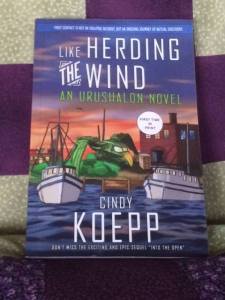Originally published November 21, 2015
I’ve been really, really busy trying to push through a major portion of my manuscript on Job. It is going quite well. That means, of course, less time to spend here. But I have a plan! This week I have a guest blogger, Cindy Keopp. She is an author of science fiction/fantasy. As it happens, I am one of her beta readers. Recently, one of her novels has become available for preorder, Like Herding the Wind, Urushalon I. It is a lovely tale and I highly recommend it.
Faith is something that winds its way throughout Cindy’s tales. It is a part of her and her journey, and so it finds its way into her novels. I asked her to tell us about that.
Cindy Koepp:
I was tempted to write an analysis of all the reasons why writers are told to avoid explicit mentions of Christianity in their writing followed by an explanation of why I ignore those suggestions. The prohibition of faith in writing would have made an interesting addition to my blog series on the Hugo and Nebula winners, but I’ll keep that topic for another time.
Instead, I’d rather have a look at the reasons why faith features so prominently in so many of my stories. The most overtly Christian of my books, Remnant in the Stars, even has a character convert to Christianity partway through the tale.
Leaving out the matters of faith would have made some things much easier. I’ve gotten into intense “discussions” with a publishing expert on the issue, been accused of trying to shove my religion up everyone’s nose, and had folks who offered to review the book later refuse because of the religion issue. Had I kept religion out of it, I would have avoided that mess altogether, but I can’t do that.
Some writers eschew the anti-religion advice because they “write for the audience of One.” In other words, they say that they don’t care what other people think because they’re writing only to please God. That’s not me. I’m not half arrogant enough to think a perfect God is interested in what I wrote. The best I can do is hope He’s not majorly offended.
Likewise, I don’t believe my writing is inspired by God. I’m not simply His scribe, and this isn’t a new Gospel I’m working on. If God were writing these tales, they’d be much more perfect than anything I come up with on my own. I wouldn’t need an editor because God doesn’t make mistakes. Trust me. I need an editor.
I write to communicate what I think and feel. Often these stories help me work through difficult things I’ve had to face. Sometimes the stories help me relate funny things that have happened. My tales contain goofy jokes and a weird sense of humor because I have a weird sense of humor and tell goofy jokes. The stories deal with complex characters and situations because life is rarely simple. All the characters are dealing with their own problems and their own joys. They have their own goals, so most of the characters in my stories have their own character arcs.
Most importantly, they have their own beliefs. People are predisposed to believe in something. In my own personal adventures, I’ve found that people put their faith and confidence in something or someone, even if that someone is found in the mirror every morning. To leave faith out of the story is to create a character that is woefully lacking in a critical element.
That’s not to say that all my stories have strong religious tendencies. One, Mindstorm: Parley at Ologo, has only one reference to God in passing toward the end. Are those characters missing something critical? No, but the details about their personal beliefs were not necessary, so rather than clutter up the work with unneeded detail, I kept the info about the characters’ religions in my notes along with other factoids. At critical points in the story, though, the religious background of the character influenced the choices the character made even if the reader never got to know the motivation for the choice.
More frequently, though, the characters’ religion plays a more active role in the story. For some characters, their faith becomes a source of strength for them in adversity, a cause for hope when practical answers are elusive, a solace in the maelstrom of family and international politics, and a comfort in times of grief.
In my personal life, faith is all these things, and I’ve only just begun to explore what faith in God can bring.
Like Herding the Wind — A Mystery. A wounded path. An alien society with centuries of work to coexistent with humans, but someone isn’t happy with the progress made. Will the human-alien team find those responsible before another human dies? In the 1600s, an Eshuvani generation ship crash-landed in a farmer’s field in Germany. Unable to find the resources on Earth to fix their ship, the Eshuvani built enclaves and tried to let the humans develop without interference. Three hundred fifty years later, Eshuvani criminals start a crime wave in the Texas coastal town of Las Palomas. With police officers being injured and killed in the efforts to stop them, Sergeant Ed Osborn attempts to use his ties to the Eshuvani community to get help for his men, but the local leadership wants nothing to do with humans. Ed contacts his urushalon, Amaya Ulonya, the Eshuvani mother he adopted when he was a boy, and seeks her help. After the death of her partner, Amaya, the captain of a police and rescue team, finds more grief than joy in her current assignment. Amidst controversy, she arranges to spearhead the new Buffer Zone station between Las Palomas and the nearby Eshuvani enclave of Woran Oldue. She hopes the opportunity to help Ed train his people will help her bury the past. The indifference of the local administration leaves her with Ill-functioning equipment and inexperienced staff. It only gets worse when the attacks of an Eshuvani criminal grow personal. Amaya must get control of her grief to help Las Palomas or risk losing someone even more dear to her than her last partner.
Cindy Koepp is originally from Michigan. She moved to Texas as a child and later received a degree in Wildlife Sciences and teaching certification in Elementary Education from rival universities. Her recently concluded adventures in education involved pursuing a master’s degree in Adult Learning with a specialization in Training and Performance Improvement. Cindy has three published science fiction and fantasy novels, a serial published online, short stories in five anthologies, and a few self-published teacher resource books. When she isn’t reading or writing, Cindy spends time whistling with a crazy African Grey. Cindy is currently an editor with PDMI Publishing and Barking Rain Press as well as an optician at monster-sized retail store.
Cindy can be found — and further enjoyed at:
Amazon Author Central: https://www.amazon.com/Cindy-Koepp/e/B008QXR2QI




No Comments